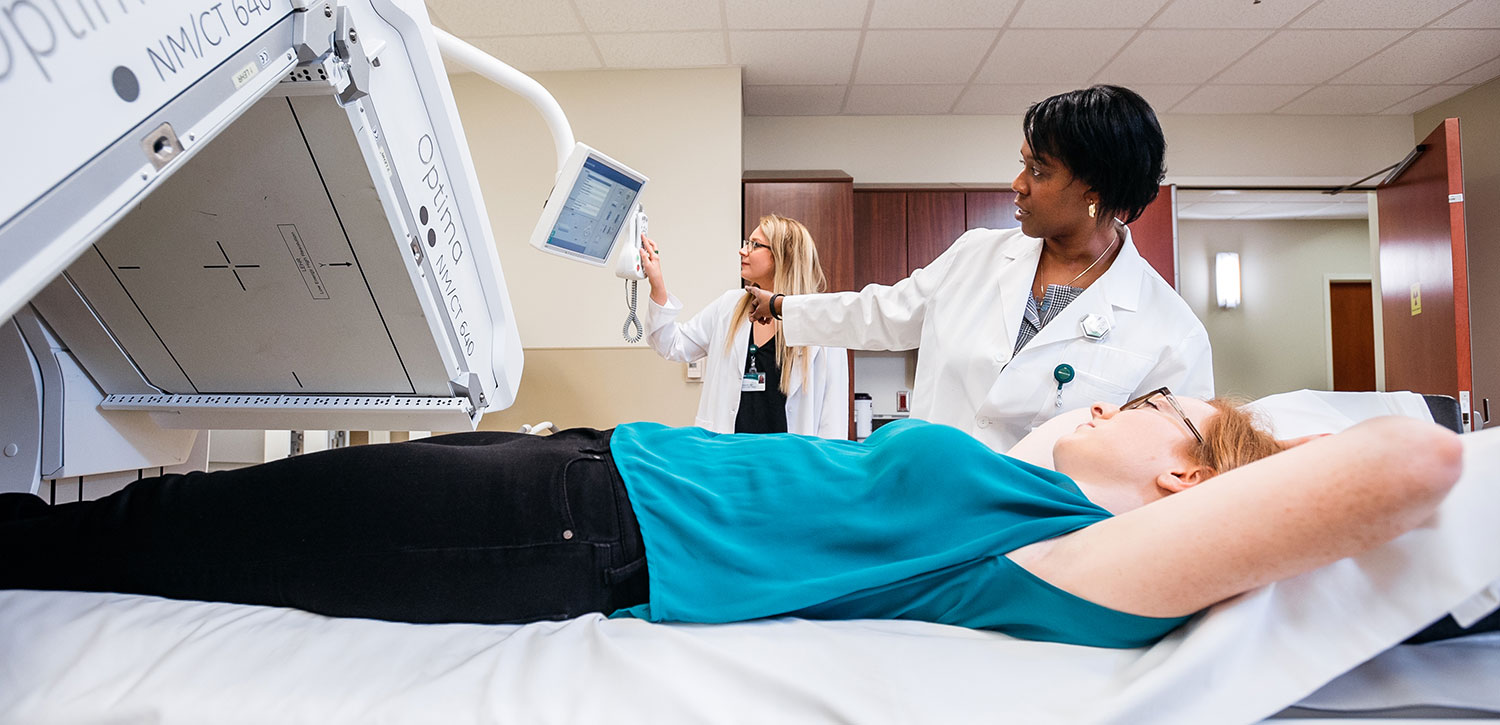Nuclear Medicine Technologist

As a Nuclear Medicine Technologist you will provide physicians with diagnostic images, diagnostic non-imaging information and treat patients for some diseases using radionuclides and radiopharmaceuticals. You will primarily prepare radioactive drugs and other adjunctive medications, administer them to patients, and operate equipment in order to create images of patients that cause abnormal areas (pathology) of the body to appear different from normal areas. Other responsibilities include using liquid radiation sources to treat and cure diseases such as cancer or hyperthyroidism.
Nuclear Medicine Technology provides information about both the function and structure of virtually every major organ system within the body with little to no patient discomfort and usually does not require the use of any anesthesia. Techniques utilizing Single Photon Emission Computed Tomography (SPECT) and Positron Emission Tomography (PET) imaging with gamma cameras enables the images to be formed. Continued new development of radiopharmaceuticals for diagnostic work and therapies allows for greater confidence between the patient and medical provider, making Nuclear Medicine an important and ongoing part of advancements in medical care.
-
Percent Change in Employment, Projected 2018 - 2028 10%Health Technologist and technicians
-
7% Nuclear Medicine Technologist
-
5% Total, all occupations
Note: All Occuations include all occupations in the U.S. Economy
Source: U.S. Bureau of Labor Statistics, Employment Projections program
Outlook and demand
Demand for Nuclear Medicine Technology is projected to grow 7 percent from 2018 to 2028, faster than the average for all occupations. An aging population may lead to the need for nuclear medicine technologists who can provide imaging to patients with certain medical conditions, such as heart disease, or treatments for cancers and other diseases.
Employers look for professionals who can:
- Work under the direction of a physician to administer radiopharmaceuticals or radiation intravenously to detect or treat diseases, using radioisotope equipment.
- Calculate, measure, and record radiation dosage or radiopharmaceuticals received, used, and disposed, using computer and following physician's prescription.
- Pay close attention while recording and processing results of procedures.
- Assist and care for others by providing assistance, attention, support, or care to others.
Paths that can lead to this career
A Master of Science degree in Nuclear Medicine Technology provides didactic and clinical coursework in a curriculum that is designed to prepare you to become a competent and productive technologist. You will earn about 1,000 hours of hands-on, clinical experience while in the program, that can be difficult to obtain outside of a program like this. These clinical hours are valuable especially if you choose to pursue further education in medicine. Please note, this program requires an interview process and clinical observation arranged by the Nuclear Medicine Technology Clinical Coordinator for admission.
-
High School
If you're currently in high school and interested in becoming a Nuclear Medicine Technologist, you can do the following steps to prepare for this career:
- Explore majors based in science or health care, such as UAB's Biomedical Sciences Major and Health Care Management Major.
- Find opportunities to job shadow Nuclear Medicine Technologists.
- Look into the requirements for the Nuclear Medicine Technology Early Acceptance Program to see if you qualify.
-
Undergraduate
If you're currently an undergraduate and interested in becoming a Nuclear Medicine Technologist, you can do the following steps to prepare for this career:
- Complete any BA or BS degree from a regionally accredited institution.
- Make sure the required prerequisite courses are in your course of study.
- Find opportunities to job shadow a Nuclear Medicine Technologist.
-
Graduate
If you already have a bachelor's degree, the following courses will help you in this program:
- Precalculus Trigonometry
- Chemistry I and II
- Pathophysiology
- Human Anatomy and Physiology
- Statistics
- Physics I and II
Job titles and employers
Did you know?
The UAB M.S. in Nuclear Medicine Technology Program is the1st program in the U.S. to rise to a Master's entry-level status.
Nuclear Medicine Technologists
Places of work for this career:
- Community hospitals
- University-affiliated teaching hospitals and medical centers
- Outpatient imaging facilities
- Public health institutions
- Government and private research institutes
To find out detailed salary information and more information on this career, you can explore theDepartment of Labor's O*Net database..
Organizations to check out for this career:
- Society of Nuclear Medicine and Molecular Imaging
- American Board of Nuclear Medicine
- American Board of Radiology
- American College of Nuclear Medicine
- American Society for Clinical Pathology
- American Society of Nuclear Cardiology
- American Society of Radiologic Technologists
- Nuclear Medicine Technology Certification Board
- Society of Diagnostic Medical Sonography
- Joint Review Committee on Educational Programs in Nuclear Medicine Technology
Next steps
Explore
Find out more information about the Nuclear Medicine Technology program.
Get Started
Learn more about admissions and financial aid now.
Early Acceptance
This program has an Accelerated Learning Opportunity!
Ask
Contact us at